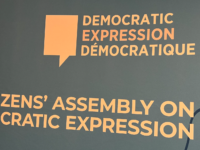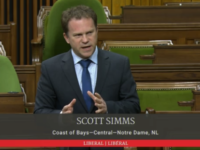The Canadian Parliament is set to resume this week and it’s a safe bet that Internet regulation will be part of the legislative agenda in the coming months. One of the toughest policy issues involve misinformation, which can be difficult to define and potentially to regulate. The Canadian Commission on Democratic Expression was established in spring 2020 with a three-year mandate to better understand, anticipate, and respond to the effects of new digital technologies on public life and Canadian democracy. As part of its work, it created a Citizens’ Assembly comprised of Canadians from across the country who recently gathered for several days to debate disinformation online. Last week, I was honoured to deliver a dinner speech to the group followed by a facilitated discussion. This week’s podcast features a recording of that lecture with the slides posted here.
Post Tagged with: "canadian heritage"
The Law Bytes Podcast, Episode 108: Scott Benzie on How Bill C-10 Ignored Canada’s Thriving Digital First Creators
The Canadian digital first creator economy isn’t something that politicians or policy makers seem to know much about, but they are quick to propose legislative reforms that directly implicate it, most recently in the form of Bill C-10. Yet the sector is thriving, with Canadian stars earning millions of dollars and attracting global audiences that often exceed Canada’s conventional film and television sector.
Scott Benzie, the CEO of Buffer Festival, started in traditional media but now advocates and works with creators, platforms and industry around online content. He joins me on the podcast to discuss the current state of digital first creators in Canada, their omission from the Bill C-10 process, and the formation of Digital First Canada, a new advocacy group to better represent the needs of the community.
The Law Bytes Podcast, Episode 106: Former Canadian Heritage Committee Chair Scott Simms Goes Behind the Scenes of the Bill C-10 Hearing
Scott Simms, a Liberal MP from Newfoundland for 17 years, was long recognized as a leading voice on Parliament Hill on cultural and digital policy. Simms recently served as the chair of the Standing Committee on Canadian Heritage, which conducted the review of Bill C-10 and which placed him at the heart of one of the year’s more controversial pieces of proposed legislation. Simms was not re-elected this past fall and is now well positioned to reflect on policy making in Canada and the issues that arose with Bill C-10. He joins the Law Bytes podcast for a conversation about the bill, his suggestions for how the process can be improved, and his thoughts on the challenges of crafting forward-looking digital policies.
Tracking the Submissions: What the Government Heard in its Online Harms Consultation (Since It Refuses to Post Them)
The Canadian government’s consultation on online harms concluded earlier this week with a wide range of organizations and experts responding with harshly critical submissions that warn of the harm to freedom of expression, the undermining of Canada’s position in the world as a leader in human rights, and the risk that the proposed measures could hurt the very groups it is purportedly intended to help. I posted my submission and pulled together a Twitter stream of other submissions.
There has been some press coverage of the consultation response from the Globe and Mail and National Post, but Canadian Heritage officials have said they will not post the submissions they received, claiming some “may contain confidential business information.” Keeping the results of the consultation is secret is incredibly damaging, raising further questions about whether the government plans to incorporate the feedback or simply march ahead with an extreme, deeply flawed proposal.
Failure to Balance Freedom of Expression and Protection from Online Harms: My Submission to the Government’s Consultation on Addressing Harmful Content Online
The government’s consultation on its proposed approach to address harmful content online concluded over the weekend. The consultation was one of several consults that ran during the election period and which raise questions about whether policy makers are genuinely interested in incorporating feedback from Canadians. I submitted to all the various consultations and will be posting those submissions this week.
I start with my online harms submission. The full submission, which touches on issues such as 24 hour takedowns, website blocking, proactive monitoring, and enforcement, can be found here. To learn more about the issues, catch my Law Bytes podcast episode with Cynthia Khoo or listen to a terrific discussion that I had together with Daphne Keller on the Tech Policy Press Podcast. The submission opens with eight general comments that I’ve posted below:











